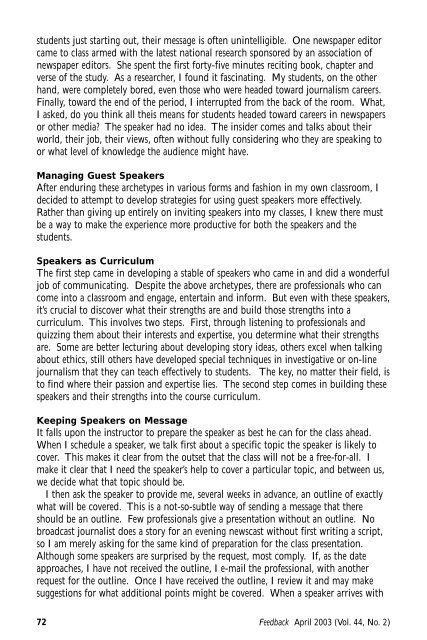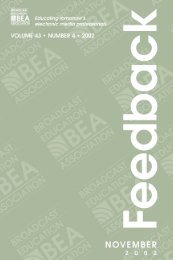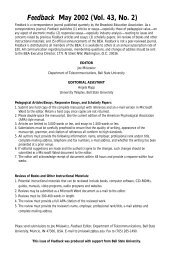students just starting out, their message is often unintelligible. One newspaper editorcame to class armed with the latest national research sponsored by an association ofnewspaper editors. She spent the first forty-five minutes reciting book, chapter andverse of the study. As a researcher, I found it fascinating. My students, on the otherhand, were completely bored, even those who were headed toward journalism careers.Finally, toward the end of the period, I interrupted from the back of the room. What,I asked, do you think all theis means for students headed toward careers in newspapersor other media? The speaker had no idea. The insider comes and talks about theirworld, their job, their views, often without fully considering who they are speaking toor what level of knowledge the audience might have.Managing Guest SpeakersAfter enduring these archetypes in various forms and fashion in my own classroom, Idecided to attempt to develop strategies for using guest speakers more effectively.Rather than giving up entirely on inviting speakers into my classes, I knew there mustbe a way to make the experience more productive for both the speakers and thestudents.Speakers as CurriculumThe first step came in developing a stable of speakers who came in and did a wonderfuljob of communicating. Despite the above archetypes, there are professionals who cancome into a classroom and engage, entertain and inform. But even with these speakers,it’s crucial to discover what their strengths are and build those strengths into acurriculum. This involves two steps. First, through listening to professionals andquizzing them about their interests and expertise, you determine what their strengthsare. Some are better lecturing about developing story ideas, others excel when talkingabout ethics, still others have developed special techniques in investigative or on-linejournalism that they can teach effectively to students. The key, no matter their field, isto find where their passion and expertise lies. The second step comes in building thesespeakers and their strengths into the course curriculum.Keeping Speakers on MessageIt falls upon the instructor to prepare the speaker as best he can for the class ahead.When I schedule a speaker, we talk first about a specific topic the speaker is likely tocover. This makes it clear from the outset that the class will not be a free-for-all. Imake it clear that I need the speaker’s help to cover a particular topic, and between us,we decide what that topic should be.I then ask the speaker to provide me, several weeks in advance, an outline of exactlywhat will be covered. This is a not-so-subtle way of sending a message that thereshould be an outline. Few professionals give a presentation without an outline. Nobroadcast journalist does a story for an evening newscast without first writing a script,so I am merely asking for the same kind of preparation for the class presentation.Although some speakers are surprised by the request, most comply. If, as the dateapproaches, I have not received the outline, I e-mail the professional, with anotherrequest for the outline. Once I have received the outline, I review it and may makesuggestions for what additional points might be covered. When a speaker arrives with72Feedback April 2003 (Vol. 44, No. 2)
an outline in hand, my experience has been the presentation is most likely to be closerto the topic we discussed in advance and with more substance.If a speaker strays or begins telling endless war stories, I then employ anotherstrategy, using questions to try to guide the speaker back on track. These questions,sometimes called task-oriented questions, are designed to bring a person or group backto a primary task, or in this case, the topic for the class period.Play to Their StrengthsOver the years I’ve found that some courses lend themselves to guest speakers morethan others. For instance, in large lecture classes, guest speakers can be a very effectivetool for helping break the pattern of hearing one person lecture over and over again.But in smaller, skills courses I’ve found guest speakers less effective. These are oftenclasses where lectures are not the primary method of teaching. Thus it may be mostappropriate to utilize guest speakers in different and creative ways. What follows arethree suggestions.BrainstormingIn skills classes where a news product in produced, it is not uncommon to have aweekly or daily news meeting as part of the course. This is the where the students,with guidance and help from the instructor, discuss story ideas. I’ve found this to bean ideal place to ask a professional to come and participate. In news organizationsthese meetings take place every day, so it’s a setting where most professionalsimmediately feel comfortable. In this setting they can help students as they thinkabout what it is that constitutes a news story, where they can find sources, what videomight help illustrate the story and so on. No matter what you teach, gettingprofessionals involved in brainstorming with students can be effective.ProductionProfessionals also have quite a bit to offer in labs where news product is produced. Ihave invited visiting professionals into these labs to sit side-by side with students asthey write and edit stories, as they put together news program rundowns, and generallybe present, offering advice during the bedlam of putting product together to air.It may seem students could get this kind of instruction from professionals duringinternships, but I have found that’s not always the case. Having a pro visit your labtakes on a much different tenor than that of a student being in a local professionalsetting during the same process. First, the professional is on the student’s turf, so thereis a fundamental power difference. The students are in charge, the professional is theadvisor, rather than in a newsroom or business where the student is an intern who mayor not be brought into the key decision-making moments. But during the student labthe professional, rather than being under deadline pressure and often not able toexplain the process they are in the middle of, are now available and open to questions.Professionals who might not be gifted in speaking before a group may be excellentwhen teaching one-on-one during the production process.CritiquingThe final way I’ve employed professionals in classroom settings is to invite a group ofBEA—Educating tomorrow’s electronic media professionals 73
- Page 1 and 2:
Educating tomorrow’selectronic me
- Page 3 and 4:
CONTENTSESSAYTransitionsRalph J. Be
- Page 5 and 6:
ESSAYTRANSITIONSBy Ralph J. Begleit
- Page 7 and 8:
party. It was a fabulous experience
- Page 9 and 10:
een accustomed to leaving my “whe
- Page 11 and 12:
ADVISING:THE LITTLE SECRET HIDDEN I
- Page 13 and 14:
• Total intake model—all studen
- Page 15 and 16:
Response to the survey has never re
- Page 17 and 18:
assessment of the Center in conclus
- Page 19 and 20:
SENSE-MAKING AND THE PERSONALVIDEO
- Page 21 and 22:
database. A limited implementation
- Page 23 and 24:
RESEARCHTHE PARTICIPATION OF WOMENI
- Page 25 and 26: Local newsroom employmentIn July 20
- Page 27 and 28: the referral source of each person
- Page 30 and 31: Discussion and ConclusionsOur analy
- Page 32 and 33: Lind, R. A., & Braun, M. J. (1996,
- Page 34 and 35: downloading services. www.schoolsuc
- Page 36 and 37: major professional selling points i
- Page 38 and 39: COURSE GRADINGElement Percent of Du
- Page 40 and 41: REVIEWHyde, Stuart (2003). Idea to
- Page 42 and 43: The primary purpose of this study i
- Page 44 and 45: detailing the number of phone numbe
- Page 46 and 47: these newscasts that “primary”
- Page 48 and 49: As Table 1.3 shows, comparing only
- Page 50 and 51: RESEARCHACCURACY IN LOCAL TELEVISIO
- Page 52 and 53: anked 26 to 50. After eliminating n
- Page 54 and 55: 2. How often do news sources compla
- Page 56 and 57: Participants were asked which one m
- Page 58 and 59: These stations still archive script
- Page 60 and 61: TABLE 12002 BEA News Division stude
- Page 62 and 63: Eiles at WCHS-TV, Portland, Maine.
- Page 64 and 65: ESSAYWHAT’S OLD IS NEW AGAIN:THE
- Page 66 and 67: are. If the news agency editor or r
- Page 68 and 69: said Sagan, just as broadcast chann
- Page 70 and 71: “We’re perfectly positioned to
- Page 72 and 73: John Miller, News Director of KTVT-
- Page 74 and 75: CLASSROOMGUEST SPEAKERS IN BROADCAS
- Page 78 and 79: professionals, often with varied jo
- Page 80 and 81: District NewsTo the members of Dist
- Page 82 and 83: several held on college campuses. I
- Page 84 and 85: 2ND PLACE: Jillian Oppegard, Colora
- Page 86 and 87: Faculty News CompetitionC.A. Tuggle
- Page 88 and 89: AWARD OF EXCELLENCE: Kevin Hager, W
- Page 90 and 91: BEA PRESIDENT’S MESSAGEGOALS AND
- Page 92: THANK YOU to the following individu
















